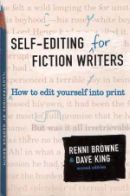
There's
a write-up today in the Star about Renni Browne's and Dave King's
Self-Editing for Fiction Writers. I have this book, and let me tell you, if you're a fiction writer, this book is one book you absolutely must have on your writing desk
at all times. The book is a guide on how to edit and polish your finished manuscripts and is very handy when you want to figure out how to make your story better:
Self-editing is important because a writer will want his/her manuscript to be as strong as possible before an independent editor works on it.
The best way to learn editing is from another editor, and this book offers you that opportunity.
Renni Browne and Dave King, who are professional editors, take the writer through the processes that an expert editor would follow to perfect a manuscript – from dialogue and exposition to point of view, interior monologue and voice.
I don't have the dead-tree version of the newspaper right now, but I'm betting there's a cut-out coupon in there for some sort of discount for this book at Kinokuniya. If so, I would very much recommend you get your writing rump to Kino's and get this book, if you haven't already.
 There's a write-up today in the Star about Renni Browne's and Dave King's Self-Editing for Fiction Writers. I have this book, and let me tell you, if you're a fiction writer, this book is one book you absolutely must have on your writing desk at all times. The book is a guide on how to edit and polish your finished manuscripts and is very handy when you want to figure out how to make your story better:
There's a write-up today in the Star about Renni Browne's and Dave King's Self-Editing for Fiction Writers. I have this book, and let me tell you, if you're a fiction writer, this book is one book you absolutely must have on your writing desk at all times. The book is a guide on how to edit and polish your finished manuscripts and is very handy when you want to figure out how to make your story better:
Ted, there's definitely a discount coupon for it. That write-up made me want to dash to Kino to get it.
ReplyDeleteAnd very well you should! It's a very useful book. Almost like an editing bible for writers.
ReplyDelete'Dead-tree version' - I like this phrase
ReplyDeleteSounds like a book no self-respecting writer should do without!
ReplyDeleteSharks: hehe... i think i must've "internalised" that one from some pro-ebook website or something.
ReplyDeleteJohn: It is, very much so. I would certainly recommend it to you. I'm sure it could help tighten your novel manuscript the way editors want it.